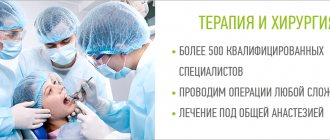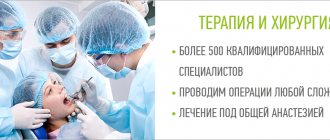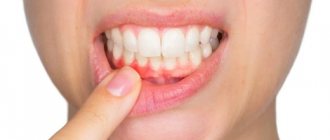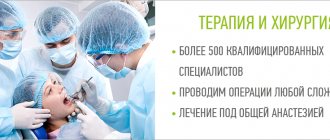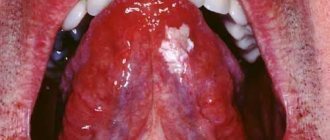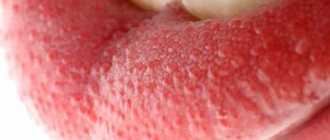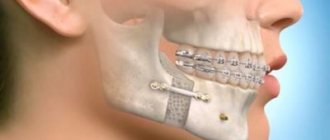Toothache always comes at the wrong time. It interferes with restful sleep, prevents you from concentrating, and pesters you at the most inopportune moments.
To get rid of unpleasant whining, terrible twitching and a growing wave of unpleasant sensations, it is enough to make an appointment with the dentists of the Nurimed clinic and undergo treatment.
If it is not possible to consult a dentist, follow the following recommendations. They will help alleviate the situation and temporarily relieve discomfort.
Causes of toothache
Unpleasant sensations can occur in children and adults. They can be associated with dental diseases or caused by other reasons. Let's take a closer look at the causes of toothache.
Why does it hurt?
- Pulpitis is an acute inflammatory process in the pulp.
- Complications after installation of a filling.
- Gingivitis is an inflammatory process in the gums.
- Complications after tooth extraction.
- Periodontitis is the appearance of throbbing pain that intensifies when touched.
- Periodontitis is an inflammation of the tissue at the root, which causes a cyst.
- Thin tooth enamel, cracks on the surface.
A tooth may hurt due to a blood disease, problems with the nervous or vascular system. The true cause is determined by the doctor during the examination. To relieve discomfort before a consultation, a person can look at home or in a pharmacy for something that helps with toothache. Painkillers allow you to sleep at night or finish important tasks and then visit the dentist.
Methods for treating exposed roots
Diagnostics and a thorough study of the pathogenesis make it possible to determine the method of treating the disease. The degree of pathology in periodontitis and other diseases that have led to tooth exposure can be determined by X-ray examination. Depending on the identified cause and degree of receding gum level, a specialist may recommend surgical or non-surgical treatment methods.
If surgery is not necessary:
- supragingival and subgingival calculus are removed;
- professional systems for cleaning the neck and roots of teeth are used;
- appropriate dental restoration is performed;
- if necessary (for periodontitis), splinting of mobile groups of teeth is carried out;
- correction of malocclusion is carried out;
- a course of therapeutic procedures is carried out aimed at restoring natural metabolic processes in the gum tissue.
- If surgical intervention is necessary, the doctor performs a flap operation to replace the required volume of gingival tissue in order to restore the aesthetics of its edge.
What to do if your tooth hurts?
First of all, try to make an appointment with a dentist for treatment as soon as possible. If this is not possible, then everyone usually has medications (tablets) for toothache in their home or car medicine cabinet that can reduce pain and wait for an appointment with the dentist in a more comfortable environment. In such cases, it is recommended to have the following medications in your first aid kit:
- Ketorol, Ketorolac are drugs with one active ingredient called Ketorolac. They help relieve severe pain for 4-8 hours.
- Nurofen, Ibuprofen, Ibuklin are medications with a pronounced analgesic effect for up to 6 hours, they additionally reduce temperature and eliminate inflammation, but it is not advisable to take more than 4 tablets per day.
- Nimesil, Ketanov are strong painkillers, the effects of which are achieved due to the synthetic component nimesulide. But it has many side effects and a long list of contraindications, so you can’t take more than 2 tablets a day.
- Tempalgin is a less effective drug, which is indicated mainly for moderate pain.
- Aspirin, Paracetamol, Analgin are medications with an antipyretic effect, but they will also help alleviate the patient’s condition. These drugs can combat mild pain. Paracetamol can be taken even by pregnant women.
- Papaverine, No-shpa - medicines against spasms and toothache. They allow you to quickly and effectively relieve discomfort.
When choosing a medicinal method to combat pain, it is necessary to take into account the recommended dosage, contraindications and the presence of chronic diseases.
Nurofen cannot be used by people with liver disease, but it effectively removes inflammatory processes due to codeine. Analgin damages tooth enamel, so the tablet is not placed on the site of pain. Tempalgin is not used for blood and kidney diseases. Limit per day – 6 tablets of medication. Ibuprofen is often used for toothache. This medicine relieves pain and inflammation, helps with hyperthermia. It is not recommended to use more than 4 tablets per day.
Anti-inflammatory drugs:
- Dexalgin. A non-steroidal drug with several release forms. Aimed at fighting inflammation.
- Nurofen. Used for pulpitis, periodontitis and swelling of the gums. Helps quickly combat an attack of pain.
- Nise. Relieves pain and inflammation, but does not eliminate the cause of the discomfort. Is a temporary solution.
Why are medications for toothache taken with caution?
- Differences in approaches to relieving unpleasant sensations in children and adults.
- Individual intolerance to the component is possible.
- You need to carefully read the instructions and take the medicine with caution if you have chronic diseases.
- Possible contraindications for use.
- There are clear restrictions on dosage per day.
IMPORTANT: taking a painkiller will not get rid of toothache forever, but only take temporary measures. The best way to relieve pain is to consult a dentist.
Symptoms, signs of the disease
Inflammation of tooth roots can be acute or chronic. The first variant of pathology is more pronounced. Here the unfavorable symptoms look like this:
- Almost constant aching pain in the affected area. Pain syndrome manifests itself regardless of the time of day. It intensifies if the affected area is impacted (cleaning, chewing, touching).
- Sensation of tooth enlargement. The patient feels the jaw not closing tightly.
- Enlarged lymph nodes under the jaw from the side of the inflamed part of the dental unit.
- Throbbing pain, accompanied by chills and increased body temperature.
- Pain transmitted to the trigeminal nerve.
Acute processes are often accompanied by the accumulation of pus in the affected area. Here the doctor faces the main task - removing secretions, eliminating the painful focus, and channel therapy according to modern protocols.
Signs of chronic pathology are:
- Pain occurs when pressing on the crown or chewing. If the tooth is not touched, it will not be painful.
- Bad breath.
- Formation of a fistula and exit of exudate through it. This symptom is especially characteristic of granulating periodontitis. This zone is often visible as a section of gum that has changed in color and appearance.
Chronic inflammation is often treated conservatively. Only in the most difficult situations is surgical intervention indicated - removal of the root tip or the entire unit at once.
How to relieve toothache at home for a pregnant woman?
When planning a new addition to the family, it is advisable for the expectant mother to visit the dentist in advance and have caries treated or teeth removed. But even a prudent woman cannot completely get rid of the risk of the sudden appearance of unpleasant sensations. Painkillers for toothache for pregnant women:
- No-spa (drotaverine) is an antispasmodic that provides temporary relief and promotes vasodilation. This drug is one of the few approved during pregnancy.
- Paracetamol is a popular and effective pain reliever that can be taken for high fever and headache. Does not have a negative effect on the fetus. Approved for occasional use.
- Nurofen is a pain reliever that helps calm discomfort in the first and second trimester. It should be used in extreme cases. In the last trimester, Nurofen should not be taken due to the risk of miscarriage. The drug provokes premature contractions of the uterus.
IMPORTANT: before taking an anesthetic, a pregnant woman should consult her gynecologist and not self-medicate.
How does tooth inflammation manifest?
The first signs of acute inflammation are:
- Redness of the gums around the tooth.
- Swelling.
- Pain when biting, pressing, and later without it.
- Sensitivity to temperature changes, sour, sweet.
- Enlargement of regional lymph nodes.
- Bleeding gums.
If the inflammation has progressed to a chronic stage, the patient may observe:
- Increase in temperature (local or general).
- Weakness.
- Intense pain.
- Inflammation is manifested in the results of clinical tests.
PROMOTION
Hygienic teeth cleaning
2000 rub.
What absolutely should not be done if you have a toothache?
- Heat the sore spot, because heat intensifies the inflammatory process and discomfort increases several times. When the ternary nerve is inflamed, heat is needed. The patient cannot diagnose this disease on his own.
- You should not lie down to rest on the sore side. But if the pain strikes late at night, you should take a painkiller and lie down on the healthy side.
- Chew food while affecting the aching tooth. This can lead to increased inflammation and a general worsening of the situation.
- Don't brush your teeth. Insufficient oral hygiene leads to the proliferation of bacteria and increased inflammation.
- Keep the tooth cold. Dentists recommend that patients avoid drafts and walks in windy or frosty weather.
"Do no harm!" – this is the main principle of independent struggle with pain. It is worth adhering to in order to filter the advice of well-wishers for the presence of common sense in them.
IMPORTANT: all of the above tips on how to get rid of toothache are temporary solutions. You can resort to them only under one condition, if we are talking about a subsequent visit to the dentist and complex treatment.
Try not to let the situation get worse and not to self-medicate, so as not to harm your health and not waste valuable time treating a complicated disease. The dentists of the Nurimed clinic will help you get rid of pain and restore the health of your teeth. To make an appointment at a convenient time in St. Petersburg, just call and you will be scheduled for a consultation, at which the clinic’s dentist will choose an effective treatment.
Why do the roots of teeth become inflamed?
- As a consequence of advanced untreated caries or pulpitis. In this case, we are talking about infectious periodontitis, in which inflammation gradually spreads to the periodontium and rapidly progresses. In some cases, the cause of apical periodontitis may be complications of sinusitis or osteomyelitis (the so-called extradental form).
- When injured. The development of traumatic periodontitis can be provoked not only by heavy objects hitting the face or a strong blow to the jaw during a fall, but even minor, but constantly recurring microtraumas. As a rule, traumatic periodontitis is particularly acute.
- Improper treatment of pulpitis can also lead to inflammation of the tooth root - drug-induced periodontitis. The inflammatory process develops as a result of the contact of drugs containing arsenic or other potent chemical compounds on the surface of the periodontium. Sometimes the root becomes inflamed as a result of an acute allergic reaction to certain medications used in the conservative treatment of pulpitis.
Other factors leading to periodontitis
- Obstruction of root canals.
- Perforation of the root wall or cavity.
- The appearance of cysts, which can be located around the very root of the tooth or grow into the maxillary sinuses.
- Damage to the root during the removal of the stump or pin.
In some cases, we are not talking about apical, but about the so-called marginal periodontitis, in which not only the apex of the tooth root is affected, but also the gums in its cervical part. The treatment of such severe pathology should be carried out by a specialized periodontist.
Choosing a toothbrush
You need to start strengthening your teeth at home by choosing the right toothbrush, and for this, consult a dentist. Manufacturers produce a huge range of models with bristles of varying degrees of hardness and thickness. For example, in products from the Curaprox brand (Switzerland), the number of bristles can reach up to 12 thousand.
- To clean the interdental spaces and elements of braces, it is worth buying a mono-tuft brush.
- An electric brush will help you achieve the highest quality cleaning - for example, it makes it easy to control the duration of the procedure.
- Ultrasonic models remove tartar at the initial stage of formation.
- Ionic electric brushes additionally affect plaque with negatively charged ions, removing it from hard-to-reach places.
- You can separately purchase a brush to clean your tongue, since this is where a large number of bacteria accumulate.
Is it possible to do without going to the dentist?
A visit to the dental clinic is the only way to get rid of inflammation and, if possible, save the tooth. The sooner the drugs are taken, the higher the likelihood of a favorable outcome. Otherwise, the patient risks getting the complications described above, among which tooth loss is not the most unpleasant outcome.
Timely detection of the disease is the key to success. Don't rely on home treatment. Without the intervention of a dentist, tooth inflammation can only progress, causing more and more dangerous consequences over time.
Rinse to strengthen teeth
According to dentists, many people make the mistake of ignoring this procedure for strengthening teeth. Even after high-quality teeth cleaning, plaque remains under the gums and in the spaces between teeth. Not to mention that not everyone can brush their teeth during the day. The solution is to use balms-rinses to strengthen teeth. The liquid perfectly washes plaque from hard-to-reach places.
To prevent diseases and strengthen teeth at home, we recommend universal rinses that remove bacterial plaque, freshen breath, preserve the natural color of teeth, and promote tissue regeneration. These include products from the brands Jason, Donfeel, Twin Lotus.
Strengthening gums: the right approach
Strengthening gums and teeth during gingivitis and periodontitis is possible in 2 options. Firstly, it is undergoing a professional course of treatment at the dentist, which primarily includes ultrasonic cleaning of teeth from stone and plaque. Plus a course of anti-inflammatory therapy, consisting of antiseptic rinses and special gels for the gums, which (with the exception of severe cases of periodontitis) can be easily carried out at home.
The second option concerns strengthening the gums in between courses of professional gum treatment at the dentist. If during the period of professional treatment (after removing dental plaque) products containing antiseptics and antibiotics are used, then for long-term maintenance therapy anti-inflammatory drugs are used, which will not cause harm with constant long-term use. We hope that it has become clear to you: the correct approach to gum treatment includes both professional treatment at the dentist and supportive treatment at home.
1) Removal of tartar and plaque –
How important it is to professionally clean your teeth to remove plaque and tartar, and how the condition of your gums changes just a few days after high-quality removal of dental plaque – you can see in Figure 9-10. But we once again draw your attention to the fact that in case of periodontitis, it is best to remove dental plaque not from a dentist or hygienist, but from a periodontist.
→ Video of ultrasonic teeth cleaning procedure
2) Anti-inflammatory therapy –
After removing dental plaque, the doctor will prescribe you anti-inflammatory therapy, which you can do at home. Only in cases of severe periodontitis and deep periodontal pockets (in parallel with home therapy), the doctor usually schedules an appointment once a day (for 10 days) to rinse the periodontal pockets with antiseptics. The course of treatment usually lasts 6-7 days for gingivitis, and 10 days for periodontitis.
Home therapy consists of antiseptic rinses and applications of anti-inflammatory gel to the gums. Gum treatment is carried out 2 times a day. The following drugs are usually used in the complex: Chlorhexidine solution for rinsing (its concentration can be from 0.05 to 0.25%, which will depend on the severity of inflammation), and CholisalGel for applications. How to properly treat gums with these drugs is described in detail by us in the article at the link below:
→ Treatment of gum diseases
Important : if you decide to start drug treatment, ignoring the need to remove dental plaque, then remember that behind the visible temporary decrease in the symptoms of inflammation from such treatment, you will receive a subtle, increasing destruction of the attachment of the tooth to the gum and bone tissue. Over time, it will lead to tooth mobility, their removal, and the need for expensive treatment methods (for example, splinting teeth with fiberglass or curettage of gum pockets).
Paste for strengthening teeth
Along with universal pastes for caries prevention, manufacturers offer special products that restore the pH balance of the oral cavity and prevent the formation of tartar. There are toothpastes to strengthen tooth enamel. They are low abrasive due to ultra-fine particles and contain natural strengthening components. For example, theobromine, isolated from cocoa beans, is added to Theodent Classic paste; it reduces tooth sensitivity and restores enamel strength.
Many products for strengthening tooth enamel also have a mild whitening effect. For example, the Japanese Apagard M-Plus paste delicately whitens and restores enamel, and its composition is suitable even for pregnant women. Such pastes for strengthening teeth remove the very cause of their darkening - soft plaque.
Please note that the dentist must select the paste. This is especially true for teeth strengthening products with whitening and fluoridation effects. Prescribing such a remedy to yourself can cause harm.
